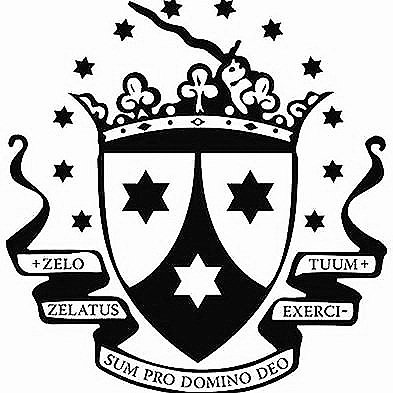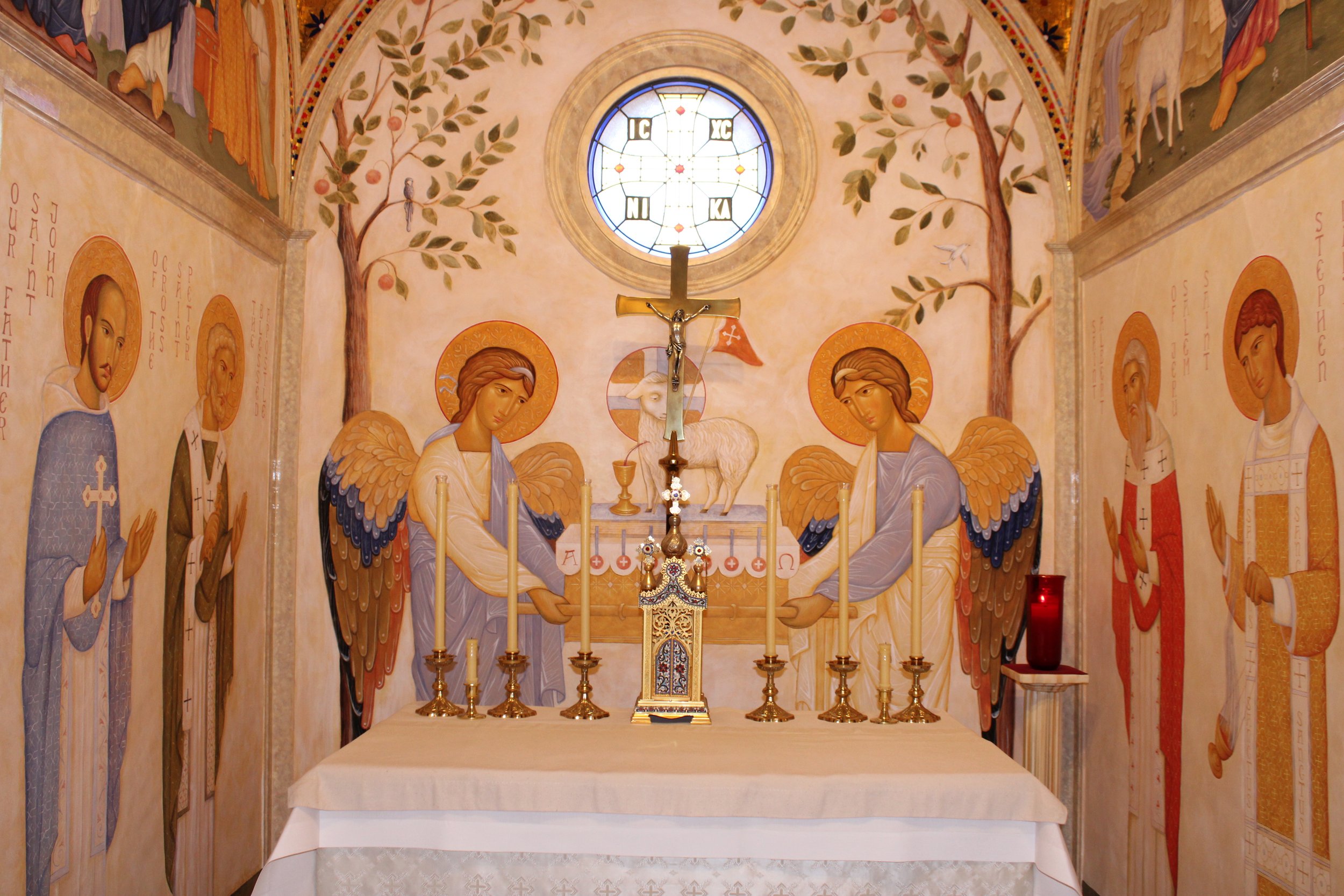Liturgy (Part 1) | The Daily Eucharist
According to the Rule of St. Albert, at the center of every Carmel, there is to be an oratory which is to “be built in the midst of the cells” for the purpose of coming together (“con-venire” in the Latin) to celebrate the Eucharist. In this synaxis, Christ is made present in the midst of the Brothers. The chapel is sacred space – a place “…where you shall come together every day early in the morning to hear Mass (ad audienda missarium), where this can be done conveniently.” (Rule of St. Albert Ch. 10).
Worship of God is at the heart of daily life in a Carmelite monastery. It is the principal event which begins each day of observance. In this regard, it is worthwhile to recall the teaching of the Church concerning the significance of the Eucharist in the life and mission of the Church – in the life of every Christian.
“At the Last Supper, on the night he was betrayed, our Savior instituted the Eucharistic sacrifice of his Body and Blood. This he did in order to perpetuate the sacrifice of the cross throughout the ages until he should come again, and so to entrust to his beloved Spouse, the Church, a memorial of his death and resurrection: a sacrament of love, a sign of unity, a bond of charity, a Paschal banquet in which Christ is consumed, the mind is filled with grace, and a pledge of future glory is given to us.” (Sacrosanctum Concilium #47; cited in Catechism of the Catholic Church #1323)
By means of the Eucharistic sacrifice, Christ plants the Cross on the summit of Mount Carmel by which each Carmelite is able to be joined to the mystery of the Lord’s Passion and participate in it. Every Carmelite religious seeks to make a personal offering in the gift of self to God through the profession of the Evangelical counsels (the vows of chastity, poverty, and obedience). This sacrifice, which is nothing less than a holocaust and our spiritual worship, is taken up by Christ in the Eucharistic sacrifice and made perfect. Of note is the custom of signing handwritten vows after making profession in the hands of the Prior and placing those vows on the altar along with the gifts to be offered during Masses of religious profession.
The Second Vatican Council also explains that the Eucharist is the “source and summit of the Christian life.” In the Eucharist “is contained the whole spiritual good of the church, namely Christ himself, our Pasch.” (Lumen Gentium #11, Presbyterorum Ordinis #5 cited in Catechism of the Catholic Church #1324). The holy sacrifice of the Mass sums up and is the summary of Carmelite life just as it is the sum and summary of Catholic Christian life. At the altar, during the sacrifice of the Mass, we find ourselves at the summit of Mount Carmel calling down fire from heaven to transform the world through the love of God outpoured from the side of Christ. Jesus longs for the world to be already ablaze with such fire! Like Elijah, Carmelites are called to prophetic witness and it is at the altar of the Lord where we are most effective in opening the heavens to cast the fire of divine love upon the world.
As the sacrament of love, the sign of unity, and the bond of charity, the daily celebration of the Eucharist brings the members of a Carmelite community together as one in God. It is the cause of our union with God and with one another. The first hermits would come from their solitude to experience communion based on a common charism defined by allegiance to Jesus Christ, but also, a communion which was sacramental. We are most truly Carmelites when we find ourselves together at the celebration of the Eucharistic Sacrifice of the Mass. It was in receiving Holy Communion during Mass at the hands of St. John of the Cross that St. Teresa of Jesus attained the supreme grace of spiritual marriage. Teresa’s experience teaches us that the Eucharist is necessary for the perfection of Carmelite life. It is the catalyst which brings about union with God.
The moment of the daily Eucharistic liturgy is the moment in which we offer to God the adoration which belongs alone to the Most Holy Trinity. It is worship characterized by the total offering of all that we are to the Father, with and in the Son, through the Holy Spirit. A Carmelite community is most truly itself in this sacred moment.
Turning to the text of the Rule (Chapter 10), the words “…in the midst of…” bring to mind the presence of the Risen Christ, who spent forty days living with and teaching his disciples about the Paschal event before ascending into heaven. Think especially of that first evening of the resurrection when Christ appears to the apostles gathered in the upper room. We find Jesus in their midst bestowing his peace and dispelling their fears. At the Eucharist, Jesus is in the midst of our Carmelite community. We are in the upper room. This is true of every Christian community where Mass is celebrated.
In like manner, the phrase “early in the morning” is evocative of Mary Magdalene’s journey and that of the other women to the empty tomb on the first day of the week which then leads to their discovery of the Risen Lord.
Finally, the precept calls to mind Peter and the other disciples who have gone fishing and were at it all night. Jesus is waiting on the shore and at dawn will call them from their fruitless labor to break their fast. The Risen Christ, the Good Shepherd, gathers his flock together after the fright of his death on the Cross. The Shepherd had been struck and the sheep scattered each to their own place. Now he makes them come together around him – the shepherd standing in the midst of his flock as they are pastured peacefully in his presence. This very dynamic plays itself out in the tension between the solitude of the hermitage and the common space of the oratory. The Brothers are gathered each morning by the Good Shepherd to be refreshed and renewed in his presence.
The Eucharist is the daily miracle in our lives in which we experience the love of Jesus – his presence in our midst! In turn, the Lord asks as he asked Peter, “do you love me?” In the strength of the food that Jesus provides we journey with Elijah to the top of the mountain where God reveals himself. A similar question is asked: “what are you doing here?” The answer: to both questions is, “Lord you know everything, you know that I love you!” and “I have been zealous, for the Lord God of Hosts.” Hearing Mass then is the occasion for us to hear a call to love… From the altar, we go forth each day to love God – to love Love – to repay love for love. “Ita Missa Est!” Go forth you are sent!

